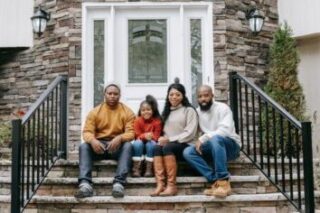
Our Community
of NYCHA residents are in the extremely low income, very low income and low income categories
of residents make less than $25,000
of NYCHA residents are unbanked compared to the New York average of 11.7%
Our Neighborhoods
When Urban Upbound was launched in 2004, one of our four cornerstones was Community Revitalization. Back then Long Island City looked very different from what it does now. Our single office stood across from Queensbridge Houses, the largest public housing development in the country. The neighborhood lacked all sorts of basic services and amenities such as supermarkets, playgrounds, parks, etc. Instead, we had empty warehouses and industrial sites, the product of years of disinvestment, and Big Allis, a power plant spewing fumes. Our co-founders worked tirelessly with community leaders from the four NYCHA developments in western Queens to change this landscape. These efforts led to a merchants association, to securing funding for local projects, and in 2010, to a key milestone in our history: the launch of a credit union. Our grassroots movement accomplished much during this period. However, our communities’ needs were extensive. Always a force of innovation, our CEO, Bishop Taylor fostered public-private partnerships to start filling the gaps.
As the doors opened to new investment in western Queens, we saw office towers go up followed by hotels and residential buildings, and yet our NYCHA neighborhoods were left out from the benefits that accompanied the economic growth. We of course didn’t wait for the solutions to come from outside. We began dialogues that resulted in successful partnerships with corporate partners, including developers. These efforts have led to the creation of good jobs for NYCHA residents and the incubation of small businesses by NYCHA entrepreneurs, in addition to the establishment of supermarkets, community spaces and green areas.
At Urban Upbound we believe that new development projects should be welcomed to the discussion table. They have the capacity to generate a significant number of new employment opportunities for residents of the area, during and after construction. In addition to good-paying jobs, many of which are union jobs, residents benefit from training opportunities, learning new skills and earning certificates that will help them advance in their careers and earn higher wages. We have seen firsthand how the new jobs created by development projects provide a pathway out of poverty for NYCHA families. Therefore, we see it as our responsibility to ensure no opportunities are missed. On the other hand, we also take very seriously our responsibility to hold developers accountable to their commitments.
While western Queens has come a long way, NYCHA families still live in poverty and experience inequity. Thus, Urban Upbound remains steadfast in our mission and goals. We pledge to continue innovating. We pledge to continue fostering dialogue with all stakeholders, such as resident association leaders, community organizations, faith leaders, business leaders and elected officials. And we pledge to continue providing NYCHA residents with tools and resources, including platforms to voice their opinions. This is a model that works and we aim to replicate it across public housing communities everywhere.









